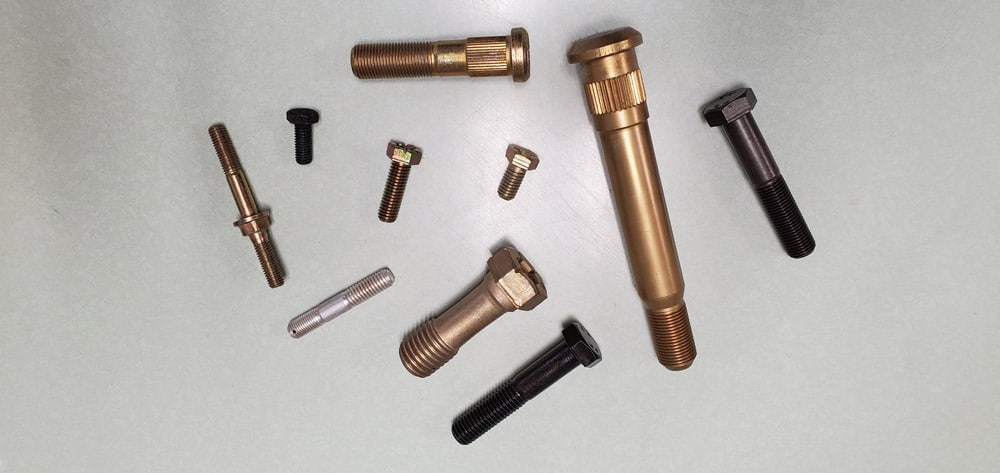Engineers and manufacturers often put a lot of thought into which type of fastener they need to bring their design to fruition. However, one important aspect can be overlooked: the coating.
Depending on your application, the type of coating used on a fastener can make or break its viability. But with so many coating options to choose from, it can be difficult to decide which one is best.
We’re here to help. Let’s take a look at some considerations to keep in mind when choosing the right fastener coating type for your application.
What Are Fastener Coatings?
Fastener coatings are chemicals applied to metal fasteners in order to improve their performance and longevity. More specifically, each coating provides different levels of the following properties:
- Corrosion resistance – The ability to prevent environmental deterioration by chemical or electrochemical reactions. Read more about fastener coatings and corrosion resistance in our previous blog article.
- Lubricity – The thickness of the coating, which helps to reduce friction and wear.
- Aesthetics – For applications where design and appearance matter (e.g. furniture), different coatings can have different aesthetic appeal. Or, in military applications, color is often an important consideration for camouflage.
- Health – The chemicals and elements used in fastener coatings can have varying effects on human health. In recent years, there has been more of a push for manufacturers to use less toxic coatings.
Types of Fastener Coatings
There are dozens of different fastener coating types available. In many cases, these coatings are proprietary, belonging to a certain manufacturer — but there are also some that are more common than others. As an example, here are four of the most common fastener coating types we work with at Wilson-Garner:
- Zinc Phosphate & Oil Coating
- Zinc Electroplate
- Cadmium Electroplate
- Zinc Non-Electrolytically Applied Coating
RELATED: Need a specialty bolt, screw, or stud? Wilson-Garner can help.
Why Is it Important to Choose the Right Fastener Coating Type?
As mentioned previously, the biggest reason to choose the right fastener coating type is that it can make or break the structural integrity of your part. The right coating can increase your parts’ lifespans by protecting the raw metal underneath from external conditions. And when your fasteners are working to keep automobiles, machinery, and structures operating properly, structural integrity is a must.
Without the right coating, your fastener could be affected by a number of threats, including chipping, rusting, galling, and exposure to other harmful chemicals.
Are There Any Situations When Fasteners Shouldn’t Be Coated?
For sure! There are some applications where a fastener coating isn’t necessary — but this is only if your fasteners, or the product they’re used for, aren’t expected to be exposed to any of the threats listed above.
If you do have an application that doesn’t require a fastener coating, it’s in your best interest to avoid it. You can save your facility some serious time and money during the production process.
How to Choose the Right Fastener Coating Type for Your Application
Now to what you’ve been waiting for: how to choose the right fastener coating type for your application. We’ll take a look at one of the most tried-and-true methods of choosing and testing fastener coatings, as well as some other important considerations to keep in mind.
NSS Testing
Neutral salt spray (NSS) testing is a method of measuring corrosion resistance. The process consists of spraying a fastener (with a certain coating) inside a test chamber with salt spray for a specified number of hours. After that time, the fastener is examined for any corrosion. If they’re corrosion-free, they pass the test.
Different types of fastener coatings can withstand the NSS test for different periods of time, which helps to rank them from highest corrosion resistance to lowest. This is an important test and consideration to remember when determining how durable your fastener and coating need to be, given your application and the elements that correspond with it.
Other Considerations for Choosing the Right Fastener Coating Type
Besides NSS testing for corrosion resistance, you’ll also want to consider the following aspects when choosing a fastener coating:
- Fastener material – Most fasteners are made of metals, but choosing the right coating for your specific type of metal is important. It’s also important to consider the material being joined by the fastener, as there are many fastener material, coating, and receiving material combinations that can lead to galling or seizing.
- Availability – It can be difficult to find a manufacturer that can apply specific or rare types of fastener coatings. Or, if you can find one, it might take some extra time for them to source it.
- Environmental impact – Some coatings that used to be common are no longer acceptable for new design, due to their known toxicity to the environment (think cadmium, hexavalent chromium). Or, if you do decide to use an environmentally unfriendly coating, you may have a harder time sourcing and paying for it today.
- Appearance – As mentioned above, if your application requires a certain aesthetic appeal, it’s important that your fastener coating matches it. Many fasteners can be seen within the products and structures they hold together, so choose a coating with a color that matches.
- Thickness – Some coatings can be applied in thin layers, while others tend to build up, cause threads not to gage, and/or add to the overall diameter of the part.
- Cost – Different fastener coatings have different price tags. Generally, the more resistant one is to corrosion, the more expensive it will be — but not always. Shop around and make sure to find one that’s within your facility’s budget.
Choosing a fastener and coating can be difficult. Let Wilson-Garner help you find a solution! Our customer-specified bolts, screws, and studs are tailored to your application’s needs and can be purchased at the limited-run quantity you desire. Give our team a call or contact us online to learn more.

